This section is for paid subscribers only. Our subscription is only $3700/- for one full year.
You get unlimited access to all paid section and features on the website with this subscription.
Subscribe to read full article
This section is for paid subscribers only. Our subscription is only $37/- for one full year.
You get unlimited access to all paid section and features on the website with this subscription.
Not ready for a full subscription?
You can access this article for $2, and have it saved to your account for one year.
- Release Date1943
- GenreDrama, Family, Fantasy
- FormatB-W
- LanguageHindi
- Run Time144 mins
- Length3959.35 meters
- Gauge35 mm
- Censor RatingU
- Censor Certificate NumberU-63/53-MUM
- Certificate Date28/07/1953
- Shooting LocationRajkamal Kala Mandir Studios
This was 'Ram Rajya' the ideal kingdom of the ideal king Ram and now this word 'Ram Rajya' has become proverbial for any good kingdom.
Our story deals with this ideal 'Ram Rajya' the kingdom of the ideal king Ram who made the greatest sacrifice by forsaking his dearest queen to please his people.
After the banishment of 14 years in the forest when Ram was again reinstated on the sacred throne of Ayodhya, the people's joy knew no bounds. Valmiki, the sage and devotee of Ram wrote the great epic poem Ramayan with Ram, the ideal king as the hero. The poem was completed and Valmiki sent his pupil Rohit to king Ram with a request to give him time to read personally to Ram, his great epic sweet in words and rich in style.
Here Ayodhya was ringing with rejoicing and festivities in celebration of the auspicious expectancy of the great queen Seeta. But as the ill fate would have it, the festivities soon met with a tragic end. A wicked old washerman of Ayodhya always suspicious about the character of his young wife expelled her out of his house saying that he was not like Ram who accepted his wife Seeta even after she stayed alone at Lanka (Ceylon). The scandal spread like fire. The infected wave that passed over the city shook even the sound minds so much so that many began to agree with the views of the washerman. To put an end to this baseless gossip, Vasistha summoned the assembly of the people (Paur Janapada). But the public opinion was drifted with that ill tide.
The king Ram was in the dilemma. He knew that Seeta was pure and chaste and had passed through the fire ordeal at Lanka, but what about the people? They must be satisfied. He was a king and one of his vows was to please his people. King Ram decided to forsake the queen, but Ram, the man was not prepared to part with his dearest wife Seeta. Fight began between Ram-the king and Ram-the man. In the end the king succeeded and the man failed.
He ordered Laxman to take the queen to the forest and leave her there. The queen was to stay there till the ill tide of the public opinion subsided and a clear shore could be seen by them.
Inspite of all his arguments Laxman has to obey the king's order and with heavy heart he took the queen to the forest.
The queen Seeta little knew why she was going to the forest except that she was going to the penance grove for freely distributing the clothes and ornaments to the venerable ones. But when the destination was reached Laxman had to disclose the fact and thousands of volcanoes erupted from her heart when she first heard the news. Laxman appeased her saying that it was not Ram that expelled Seeta, but it was the king that expelled the queen. Ram still loved Seeta as much as before. But Seeta could not be convinced and she sent away Laxman. Mad with this sudden shock she did not know what to do and but of the timely intervention of Valmiki she would have flowed away with the waters of the Ganges.
Valmiki convinced her of the king's helplessness, asked her to do her duty as a queen and reminded her of her responsibility to continue the Raghu's illustrious race. Seeta agreed to live with one condition that her name should not be disclosed to avoid the censure of herself and her husband. Valmiki agreed and took her to his hermitage, Vandevi as Seeta was called in the hermitage, gave birth to the twin princes radiant with glory that attended the Raghu's race. The boys were named Lav and Kush and grew under Seeta's tender care and Valmiki's versatile teachings. At the age of twelve the boys knew whole Ramayan by heart, learned vedas, mastered all the arts of archery and the miraculous use of all the missiles.
Hero in Ayodhya nothing could please Ram for a moment, nothing could occupy his mind except the sweet face of Seeta. The king Ram has made Ram's life miserable. For diversion Vasistha arranged the horse sacrifice which was done by the king who desired to be the paramount ruler. The horse was let loose and whoever questioned the king's supremacy captured the horse and had to fight with the protecting army of the supreme king. But there was a hitch. Any religious function could not be done without a better half-the wife. New marriage was suggested to the king but Ram refused point blank and emphasised upon the people his idel of monogamy- which is still proverbial - even at the cost of this great sacrifice. The compromise was suggested and the gold statue of Seeta was to be made to serve the purpose.
Valmiki had brought Lav and Kush also to Ayodhya to take part in this great festival of horse sacrifice. He had also another purpose. He sent the boys in the streets of Ayodhya reciting in their sweet voice the story of Ramayan replete with the noble love of Ram and Seeta. People were moved. The rituals of the sacrifice retarded, fire offerings slowed down. Brahmins lost the thread of the incantations and all the people assembled were enchanted by this sweet melody, Ram saw in these boys the reflections of himself and Seeta and he could not stand the questions from these innocent boys about the gold statue of Seeta. Ram left the place atonce. Knowing the facts from Vasistha the boys took the people to task for their thought less action and left the sinful city for their sacred hermitage. Their stirring appeal brought back the emotions in the heart of the conventional people. They could now judge the love of Seeta and Ram in terms of emotions, they began to know the pangs of separation suffered by their king and queen. They realised the injustice they had done. The emotions of the heart pierced the curtain of the rigid conventions. The ill tide subsided they could now see the shore. The reason prevailed.
Here in the meanwhile the horse was captured by Lav and a great fight ensued between these two boys and Ram's vast army. The boys with all the knowledge of arms and miraculous missiles frustrated the army and Laxman was wounded. King Ram was informed. He rushed to the penance grove (Dandakarnya) and was surprised to see the same boys who recited Ramayan. He approached them and advised them not to fight but they were determined to fight against the king who forsook his innocent wife.
How was the fight of the boys with their father whom they did not know? How Seeta played her part in this dilemma? How people of Ayodhya acquitted Seeta? How Valmiki glorified her?
All these questions can only be answered on the silver screen.
(From the official press booklet)
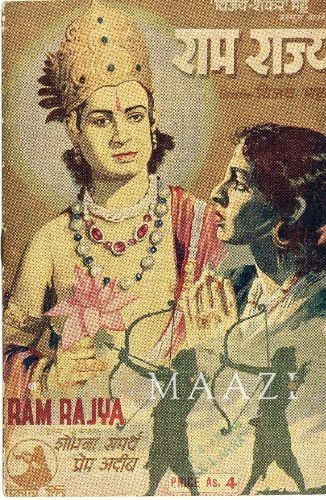
Cast
-
Shobhna Samarth
Devi Maa Sita / Vandevi -
Prem Adib
Bhagwan Shri Ram -
Umakant
Laxman -
Badri Prasad
Rishi Valmiki -
Yashwant
Luv -
Madhusudan
Kush -
Pande
Rishi Vasistha -
Pandit
Dhobi -
Shantakumari
Kaushalya -
Amirbai Karnataki
Dhoban
Crew
-
BannerShri Prakash Pict, Bombay
-
Director
-
Music Director
-
Director
-
Lyricist






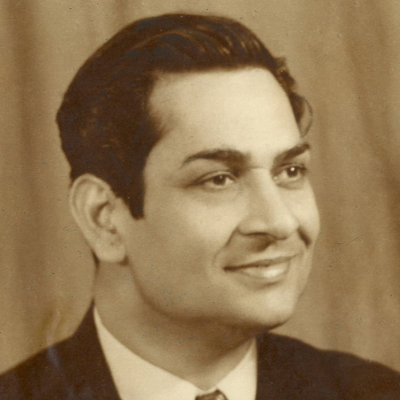
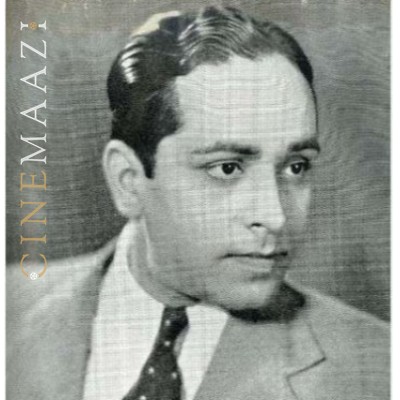
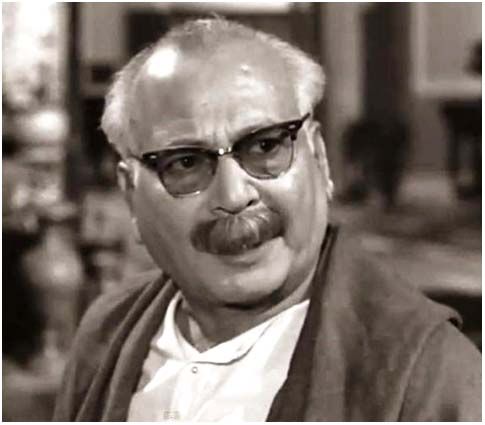
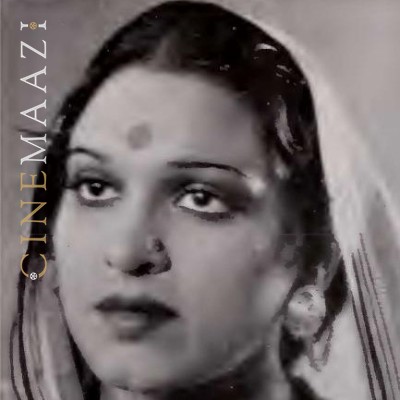

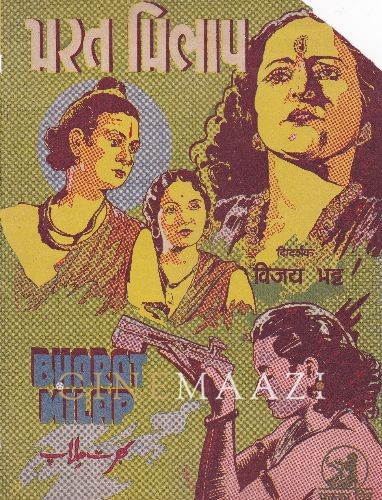
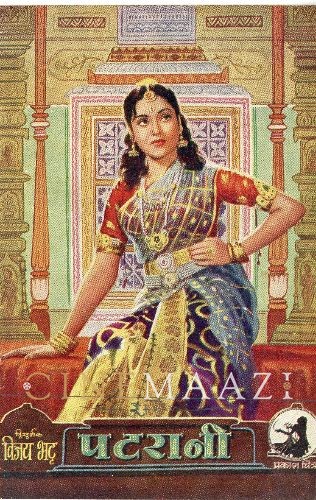

.jpg)



